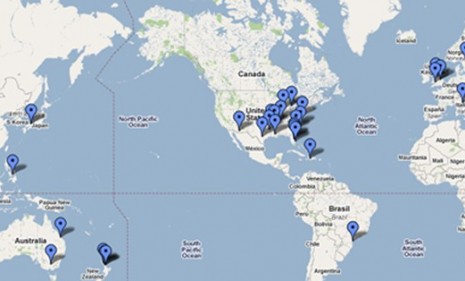Google's mass-animal-death map
The search engine has been used to map all the mass deaths of birds, fish, and other creatures around the world—and the resulting picture isn't pretty

A free daily email with the biggest news stories of the day – and the best features from TheWeek.com
You are now subscribed
Your newsletter sign-up was successful
The image: With hordes of dead animals turning up around the world, from 5,000 blackbirds dropping from the sky in Arkansas to 100 tons of fish washing ashore in Brazil, Google's mapping feature has been put to work to pinpoint the various die-offs across the world over the last month (see below). For some, the geographical portrait is only adding to the hype surrounding the mass animal deaths, but others see it as a possible tool for figuring out what's behind them.
The reaction: "As we approach the end of time amid a flurry of bloody feathers, fish carcasses, and plentiful crab cakes, Google has, as it always does, given us a means of approaching our imminent demise easily and with style," says Alex Alvarez in Mediaite. Yeah, "I scoffed yesterday at the rash of dead animals turning up all over the world, blaming the media (guilty!) for focusing too much attention on the phenomenon," says Melissa Bell in The Washington Post. Unfortunately, this map isn't likely to do anything to quiet the conspiracy theories. At the same time, says Nicholas Jackson in The Atlantic, the map could "help to solve the conundrum" of what's causing these mass animal deaths by helping people spot similarities or patterns. See for yourself, below:
A free daily email with the biggest news stories of the day – and the best features from TheWeek.com
The Week
Escape your echo chamber. Get the facts behind the news, plus analysis from multiple perspectives.

Sign up for The Week's Free Newsletters
From our morning news briefing to a weekly Good News Newsletter, get the best of The Week delivered directly to your inbox.
From our morning news briefing to a weekly Good News Newsletter, get the best of The Week delivered directly to your inbox.
-
 The ‘ravenous’ demand for Cornish minerals
The ‘ravenous’ demand for Cornish mineralsUnder the Radar Growing need for critical minerals to power tech has intensified ‘appetite’ for lithium, which could be a ‘huge boon’ for local economy
-
 Why are election experts taking Trump’s midterm threats seriously?
Why are election experts taking Trump’s midterm threats seriously?IN THE SPOTLIGHT As the president muses about polling place deployments and a centralized electoral system aimed at one-party control, lawmakers are taking this administration at its word
-
 ‘Restaurateurs have become millionaires’
‘Restaurateurs have become millionaires’Instant Opinion Opinion, comment and editorials of the day